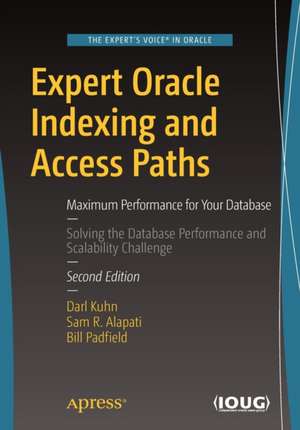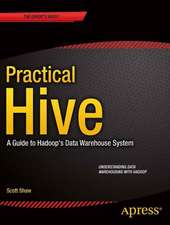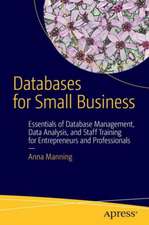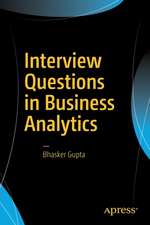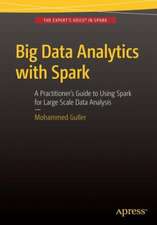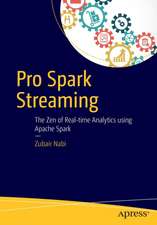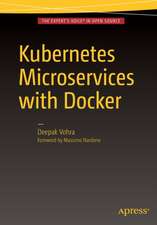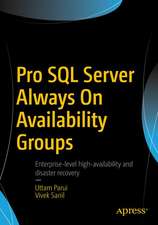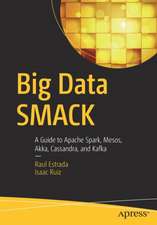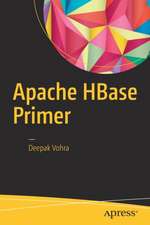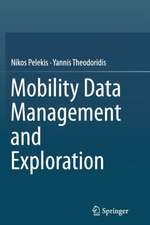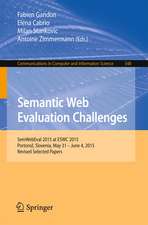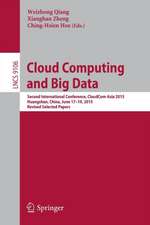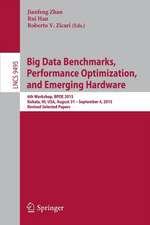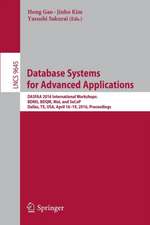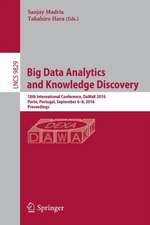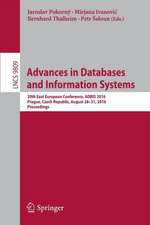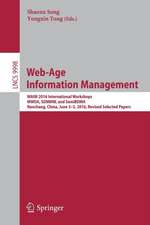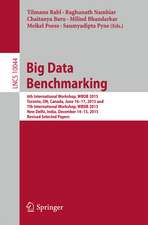Expert Oracle Indexing and Access Paths: Maximum Performance for Your Database
Autor Darl Kuhn, Sam R. Alapati, Bill Padfielden Limba Engleză Paperback – 28 sep 2016
Speed up the execution of important database queries by making good choices about which indexes to create. Choose correct index types for different scenarios. Avoid indexing pitfalls that can actually have indexes hurting performance rather than helping. Maintain indexes so as to provide consistent and predictable query response over the lifetime of an application.
Expert Oracle Indexing and Access Paths is about the one database structure at the heart of almost all performance concerns: the index. Database system performance is one of the top concerns in information technology today. Administrators struggle to keep up with the explosion of access and activity driven by the proliferation of computing into everything from phones to tablets to PCs in our increasingly connected world. At the heart of any good-performing database lies a sound indexing strategy that makes appropriate use of indexing, and especially of the vendor-specific indexing features onoffer.
Few databases fully exploit the wealth of data access mechanisms provided by Oracle. Expert Oracle Indexing and Access Paths helps by bringing together information on indexing and how to use it into one blissfully short volume that you can read quickly and have at your fingertips for reference. Learn the different types of indexes available and when each is best applied. Recognize when queries aren’t using indexes as you intend. Manage your indexing for maximum performance. Confidently use the In Memory column store feature as an alternate access path to improve performance. Let Expert Indexing in Oracle Database 12c be your guide to deep mastery of the most fundamental performance optimization structure in Oracle Database.
Expert Oracle Indexing and Access Paths is about the one database structure at the heart of almost all performance concerns: the index. Database system performance is one of the top concerns in information technology today. Administrators struggle to keep up with the explosion of access and activity driven by the proliferation of computing into everything from phones to tablets to PCs in our increasingly connected world. At the heart of any good-performing database lies a sound indexing strategy that makes appropriate use of indexing, and especially of the vendor-specific indexing features onoffer.
Few databases fully exploit the wealth of data access mechanisms provided by Oracle. Expert Oracle Indexing and Access Paths helps by bringing together information on indexing and how to use it into one blissfully short volume that you can read quickly and have at your fingertips for reference. Learn the different types of indexes available and when each is best applied. Recognize when queries aren’t using indexes as you intend. Manage your indexing for maximum performance. Confidently use the In Memory column store feature as an alternate access path to improve performance. Let Expert Indexing in Oracle Database 12c be your guide to deep mastery of the most fundamental performance optimization structure in Oracle Database.
- Explains how indexes help performance, and sometimes hinder it too
- Demystifies the various index choices so that you can chose rightly
- Describes the database administration chores associated with indexes
- Demonstrates the use of the In Memory column store as an alternate access path to the data
- Create an overall indexing strategy to guide your decisions
- Choose the correct indexing mechanisms for your applications
- Manage and maintain indices to avoid degradation and preserve efficiency
- Take better advantage of underused index types such as index-organized tables
- Choose the appropriate columns to index, with confidence
- Blend partitioning and materialized views into your indexing strategy
Who This Book Is For
All levels of database administrators and application developers who are struggling with the database performance and scalability challenge. Any database administrator involved with indexing, which is any database administrator period, will appreciate the wealth ofadvice packed into this gem of a book.
Preț: 647.75 lei
Preț vechi: 809.69 lei
-20% Nou
Puncte Express: 972
Preț estimativ în valută:
124.00€ • 127.81$ • 104.55£
124.00€ • 127.81$ • 104.55£
Carte tipărită la comandă
Livrare economică 27 februarie-13 martie
Preluare comenzi: 021 569.72.76
Specificații
ISBN-13: 9781484219836
ISBN-10: 148421983X
Pagini: 234
Ilustrații: XIX, 257 p. 20 illus., 8 illus. in color.
Dimensiuni: 178 x 254 x 21 mm
Greutate: 5.31 kg
Ediția:2nd ed.
Editura: Apress
Colecția Apress
Locul publicării:Berkeley, CA, United States
ISBN-10: 148421983X
Pagini: 234
Ilustrații: XIX, 257 p. 20 illus., 8 illus. in color.
Dimensiuni: 178 x 254 x 21 mm
Greutate: 5.31 kg
Ediția:2nd ed.
Editura: Apress
Colecția Apress
Locul publicării:Berkeley, CA, United States
Cuprins
1. Introduction to Oracle Indexes.- 2. B-Tree Indexes.- 3. Bitmap Indexes.- 4. Index-organized Tables.- 5. Specialized Indexes.- 6. Partitioned Indexes.- 7. Tuning Index Usage.- 8. Maintaining Indexes.- 9. SQL Tuning Advisor.- 10. In Memory Column Store.
Notă biografică
Darl Kuhn is a senior database administrator working for Oracle. He handles all facets of database administration from design and development to production support. He also teaches advanced database courses at Regis University in Colorado. Darl does volunteer DBA work for the Rocky Mountain Oracle Users Group. He has a graduate degree from Colorado State University and lives near Spanish Peaks, Colorado, with his wife, Heidi, and daughters, Brandi and Lisa.
Sam R. Alapati is an experienced Oracle database administrator who holds the Oracle Certified Professional designation and the Hewlett-Packard UNIX System Administrator certification. He currently manages Oracle databases at the Boy Scouts of America's national headquarters in Los Colinas, Texas. Alapati has been dealing with databases for a long time, including the Ingres RDBMS in the mid-1980s. He is also well-versed in the Microsoft SQL Server, Sybase, and IBM DB2 database management systems.
Bill Padfield is an Oracle Certified Professional, working for a large telecommunications company in Denver, Colorado as a lead database administrator. Bill helps administer and manage a large data warehouse environment consisting of more than 75 databases. Bill has been an Oracle Database administrator for more than 14 years, and has been in the IT industry since 1985. Bill also teaches graduate database courses at Regis University and currently resides in Aurora, Colorado with his wife, Oyuna, and son, Evan.
Textul de pe ultima copertă
Speed up the execution of important database queries by making good choices about which indexes to create. Choose correct index types for different scenarios. Avoid indexing pitfalls that can actually have indexes hurting performance rather than helping. Maintain indexes so as to provide consistent and predictable query response over the lifetime of an application.
Expert Oracle Indexing and Access Paths is about the one database structure at the heart of almost all performance concerns: the index. Database system performance is one of the top concerns in information technology today. Administrators struggle to keep up with the explosion of access and activity driven by the proliferation of computing into everything from phones to tablets to PCs in our increasingly connected world. At the heart of any good-performing database lies a sound indexing strategy that makes appropriate use of indexing, and especially of the vendor-specific indexing features on offer.
Few databases fully exploit the wealth of data access mechanisms provided by Oracle. Expert Oracle Indexing and Access Paths helps by bringing together information on indexing and how to use it into one blissfully short volume that you can read quickly and have at your fingertips for reference. Learn the different types of indexes available and when each is best applied. Recognize when queries aren’t using indexes as you intend. Manage your indexing for maximum performance. Confidently use the In Memory column store feature as an alternate access path to improve performance. Let Expert Indexing in Oracle Database 12c be your guide to deep mastery of the most fundamental performance optimization structure in Oracle Database.
Expert Oracle Indexing and Access Paths is about the one database structure at the heart of almost all performance concerns: the index. Database system performance is one of the top concerns in information technology today. Administrators struggle to keep up with the explosion of access and activity driven by the proliferation of computing into everything from phones to tablets to PCs in our increasingly connected world. At the heart of any good-performing database lies a sound indexing strategy that makes appropriate use of indexing, and especially of the vendor-specific indexing features on offer.
Few databases fully exploit the wealth of data access mechanisms provided by Oracle. Expert Oracle Indexing and Access Paths helps by bringing together information on indexing and how to use it into one blissfully short volume that you can read quickly and have at your fingertips for reference. Learn the different types of indexes available and when each is best applied. Recognize when queries aren’t using indexes as you intend. Manage your indexing for maximum performance. Confidently use the In Memory column store feature as an alternate access path to improve performance. Let Expert Indexing in Oracle Database 12c be your guide to deep mastery of the most fundamental performance optimization structure in Oracle Database.
- Explains how indexes help performance, and sometimes hinder it too
- Demystifies the various index choices so that you can chose rightly
- Describes the database administration chores associated with indexes
- Demonstrates the use of the In Memory column store as an alternate access path to the data
Caracteristici
Explains how indexes help performance, and sometimes hinder it too Demystifies the various index choices so that you can chose rightly Describes the database administration chores associated with indexes
